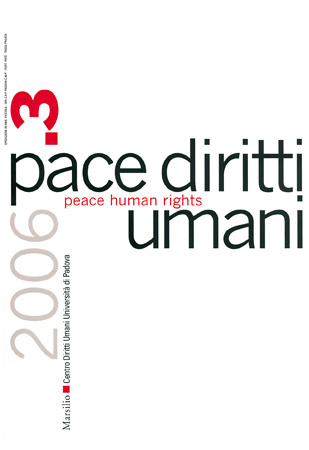Raccolte

Il Diritto internazionale per la vita e per la pace è quello dei diritti umani. Riflessioni sul Messaggio di Benedetto XVI per la Giornata mondiale della pace 2007
- Contenuto in
- Pace diritti umani - Peace Human Rights, 3/2006
- Tipologia pubblicazione
- Documentazione
- Pagine
- 127-131
- Lingua
- IT
The International Law of Human Rights is the Universal Law for Life and Peace. Reflexions on the Message of Benedict XVI for the 40th World Day of Peace 2007
Antonio Papisca
To emphasize the centrality of the human being, the Pope says: «heart of peace». By linking life and peace he urges to become aware that these values are at the same time «gift and task». The Pope invites to catch the deep significance of this mandate and to implement it following «the “grammar” that is written in the heart of the human being by his divine Creator». When Benedict XVI strongly denounces the ongoing relativism regarding the human person he can actually rely on the «new» International Law that is rooted in the United Nations Charter, in the Universal Declaration of Human Rights and in other international legal instruments. In effect Article 1 of the Universal Declaration proclaims that fundamental rights and freedoms are «inherent rights», then universal, inviolable, indivisible and interdependent.
This is a limpid ontologic truth that qualifies the core principles of International Law of human rights as ius cogens. The link of individual life with peace is explicitely emphasized by the Universal Declaration when it states that «recognition of the inherent dignity and of the equal and inalienable rights of all members of the human family is the foundation of freedom, justice and peace in the world»: we could translate the sentence by saying that human dignity is the cornerstone of world order and of whatever social and political system.
Two paragraphs of the Message, devoted to international law and institutions, raise some crucial questions. In front of the ongoing violence stemming from terrorism and «unprecedented» ways of armed conflicts, the Message gives room to the exception of self-defence by quoting what is (still) written in the Catechism of Catholic Church, in particular n. 2308: «as long as the danger of war persists and there is no international authority with the necessary competence and power, governments cannot be denied the right of lawful self-defense, once all peace efforts have failed». We argue, as a matter of principle, that if life and peace, as supreme values, are the sides of the same coin, then both death penalty and the use of force for war purposes cannot be justified.
Furthermore, since an «international authority with the necessary competence» does exist – the United Nations –, the real problem lies in «power», which depends not on the UN but on States. The comment is that we cannot, morally and politically, allow States (by recalling some pieces of bellum iustum) not to comply with their legal pledges to provide the United Nations what is required, in terms of human and material resources, for its effective functioning.

